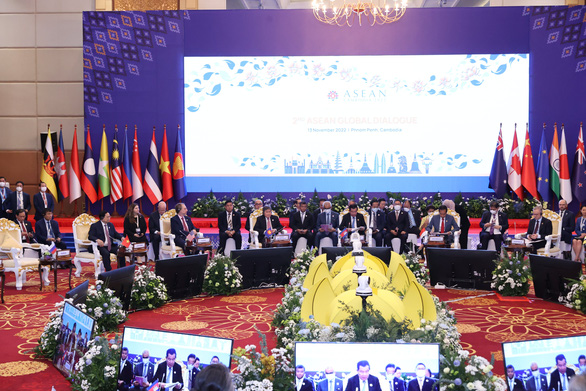Editor’s note: The author of this article is Dr. Ahmad Rizky M. Umar, a researcher and tutor at the University of Queensland, Australia. The views are his.
In November 2022, every eye seems to be directed to Southeast Asia. Last week, Cambodia successfully hosted the ASEAN Summit and the East Asia Summit, where major ASEAN dialogue partners attended the forum and met briefly with their counterparts. This week, Indonesia hosts the most difficult G20 Summit in Bali, after a year full of preparatory meetings from Sherpa, ministers, and engagement groups. Thailand hosts APEC meetings attended by APEC political, economic, and business leaders.
This series of meetings seems to be a regular diplomatic haunt of these regional and international organizations. Nevertheless, given the global political tension today, these meetings bear exceptional tasks. They are held not only after COVID-19 waves, but also amid disastrous impacts of the Russia-Ukraine war, ongoing U.S.-China rivalry, economic recessions, and global food and energy security challenges.
These conditions have directed more expectations for host countries to be able to produce viable solutions to these problems. But another question arises: can Southeast Asian countries play a central role in resolving the world problem?
There are good reasons as to why Southeast Asia could play constructive roles in moving the attempts to resolve global crises further. First, Southeast Asian countries are largely middle powers who establish relations with major global actors but they do not explicitly forge an alliance with any great power.
Indeed, several Southeast Asian countries have close bilateral relations with either the United States, China, or Russia. Nevertheless, in the past three decades, Southeast Asian countries have been wary of great power interference so they tend to utilize diplomatic channels and a collective approach in engaging with major great powers. Southeast Asian countries, for example, have engaged with both the United States and China through diplomatic mechanisms – particularly East Asia Summit and ASEAN Regional Forum, in addition to dialogue partner mechanisms – to maintain a relationship with the two great powers.
Second, as I have mentioned, ASEAN – the biggest regional organization in Southeast Asia – also plays important roles in establishing diplomatic channels to deal with great powers. Most great powers are ASEAN’s dialogue partners, who participate in key meetings with regional countries, such as the East Asia Summit or ASEAN Regional Forum.
Southeast Asian countries have signed the Treaty of Amity and Cooperation (TAC) in ASEAN, which gives rise to a collective commitment to neutrality in great power politics. This means that Southeast Asian countries use existing mechanisms within ASEAN and primarily leverage diplomatic instruments to resolve any regional problem peacefully. This makes Southeast Asian countries become an important player in mediating the tensions between great powers.
But these strengths have also become the source of their weakness in the past decade. With the rift between China and the United States having grown into great power rivalry and a trade war, many Southeast Asian countries are vulnerable to the excess of the crisis.
China, for example, has initiated various development projects through the Belt & Road Initiative, of which Southeast Asian countries are major participants. Although these projects are largely meant to meet Southeast Asia’s needs for infrastructural development, there are risks that China’s active involvement in funding development projects in Southeast Asia could cost their neutrality in mediating great power rivalry between Washington and Beijing.
At the same time, the United States has also initiated major alliances, such as the Quadrilateral Security Cooperation (the Quad) and Australia-United Kingdom-United States (AUKUS), which involved major U.S. allies in the Indo-Pacific region. These models inevitably affect Southeast Asia geopolitically, whose geographical areas reside within the boundaries of their cooperative spheres.
So far, ASEAN has responded only by releasing the ASEAN Outlook on Indo-Pacific, which is only a statement of its views about Indo-Pacific cooperation and not offering a viable road map to manage the excess of great power politics in the region. The bloc has yet to resolve the Myanmar problem in the past two years, as it is stuck with the Five-Point Consensus.
Thus, for Southeast Asian countries to mediate great power conflicts, they need to consider what they can and cannot do realistically. Regional countries can, and should, do their duties to host regional and international meetings, while ensuring such meetings are held successfully regardless of the outcomes. But it also means strengthening the capacity and directions of ASEAN to deal with the coming global crises.
ASEAN needs to mediate the crisis in Myanmar and provides much better solutions than the Five-Point Consensus, which has failed to prevent the humanitarian catastrophe in the country. It is equally important to widen existing diplomatic mechanisms and dialogue partners, as well as revising the ASEAN Charter to be able to resolve intra-regional conflicts.
It is the role that Vietnam, considering its past experience as ASEAN Chair in 2020, could play in ASEAN in the future. During the COVID-19 pandemic, Vietnam has been praised for its role as ASEAN Chair in the challenging year, eventually credited with major initiatives to tackle challenges during the pandemic. In this context, Vietnam could take a leading role in ensuring ASEAN mechanisms to be taken seriously in dealing with contemporary challenges, particularly with great powers in the future.





















































